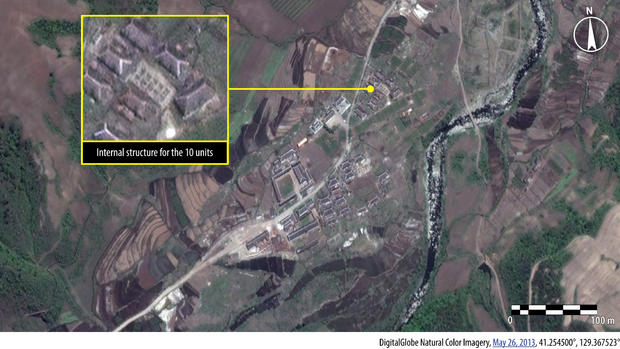Amnesty Int'l: New satellite images show North Korea continues expansion of labor camps
North Korea is continuing to expand its labor camps for political prisoners, according to a report released Wednesday by Amnesty International.
Satellite images show that contrary to the nation's efforts to show it is opening up under leader Kim Jong Un, North Korea is maintaining its infamous gulags, the human rights organization said.
“It’s the grim confirmation that whatever cosmetic changes may have occurred around the capital city of Pyongyang, that has not resulted in a change in the circumstances for those who are most repressed and brutalized in North Korea,” said Frank Jannuzi, deputy executive director of advocacy, policy and research at Amnesty International, in a telephone interview with CBSNews.com, from Washington.
“We see continued investment. We see new housing structures, we see new perimeter security, we see continued evidence of economic activity [forced labor], we see enhancements of road, rail and other infrastructure, we see food and other storage facilities being built at these camps. So none of that evidence supports the contention that these camps are disappearing,” added Jannuzi.
According to Jannuzi, Camp 16 is one of the most mysterious camps in the country.
“It’s in one of the most mountainous regions of North Korea, in the northeast. This is a part of North Korea that North Koreans themselves rarely frequent. It’s in one of the most isolated places. There are no foreigners who frequent that part of North Korea, and to the best of my knowledge, there’s never been an international visit,” said Jannuzi.
“What our satellite imagery shows us is far from dismantling these camps, North Korea is in some cases expanding its architecture of repression.”
Amnesty International estimates that Camp 16, which is three times the size of Washington D.C., houses anywhere between 5,000 and 50,000 political prisoners and their families.
“One of the harshest things about these camps is they use collective punishment. … if the father is found to be unreliable and they want to detain him, they may also send his young children and his elderly parents, all of them to the gulag,” said Januzzi.
Detainees are often sent there without formal judicial proceedings, and can be held for pre-trial detention indefinitely.
New eyewitness testimony released in Amnesty International’s
report include that of a former prison guard of Camp 16, whose name was withheld but was referenced as Mr. Lee. He reported inmates being forced to dig their own graves before being summarily
executed, and women and children being raped, according to Amnesty International.
“There’s inadequate health care; there’s no education; there’s inadequate sanitation and food; there’s malnutrition which is rampant in the camps, even starvation,” said Januzzi.
According to Amnesty International, besides systematically being threatened with death and torture, inmates are forced to work arduous hours, often being allowed to eat and sleep only between 12 a.m. and 4 a.m.
“We can see the coal being mined from the hills, we can see the lumber being cut from the hillsides and we can watch as those materials are shipped out of the gulags as a result of forced prison labor,” said Januzzi.
Amnesty International compared its latest satellite images to images taken in 2008. The images have been sent to the United Nations, to form part of the Commission of Inquiry on Human Rights in the Democratic People’s Republic of Korea.
“We hope that these images may some day find their way into crimes against humanity tribunals. … That there is no statute of limitations into the kinds of murders and brutalities that are taking place in these facilities,” said Januzzi.
